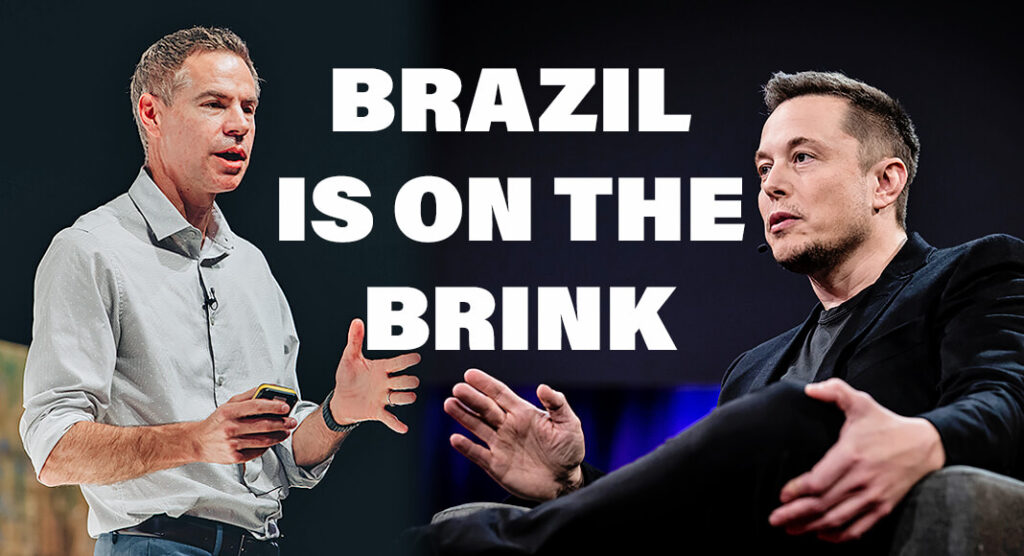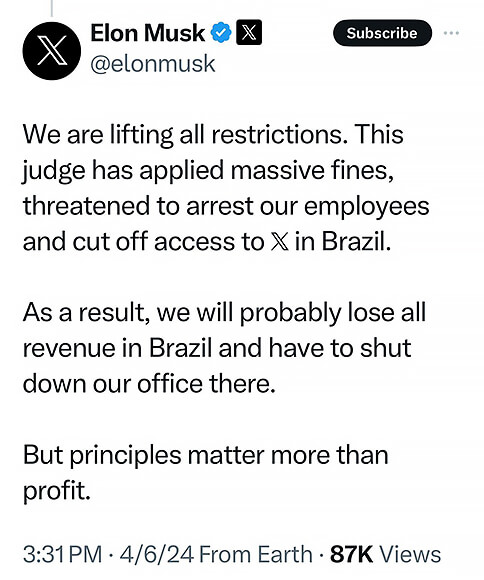
Texas Border Business
Texas Border Business
In an era where digital platforms serve as the new battlegrounds for freedom of speech, Brazil’s current political and judicial maneuvers present a chilling forecast for democracy. This concern was recently amplified by a message on “X” (formerly Twitter), validated by the platform’s owner, Elon Musk. The message, posted by Michael Shellenberger, sheds light on a series of events that suggest Brazil is teetering on the edge of authoritarian rule.

ELON MUSK WROTE AND POSTED: We are lifting all restrictions. This judge has applied massive fines, threatened to arrest our employees and cut off access to X in Brazil.
As a result, we will probably lose all revenue in Brazil and have to shut down our office there.
But principles matter more than profit. 3:31 PM • 4/6/24 From Earth.
Elon Musk posted on “X”: To Ensure that you can still access the “X” platform, download a VPN App.
At precisely 5:52 pm Eastern Time on April 6, 2024, X announced a court mandate from Brazil, compelling the platform to restrict access to certain popular accounts, a decision reminiscent of actions taken by authoritarian regimes. The twist came less than an hour later when Musk publicly refused to comply, stating, “As a result, we will probably lose all revenue in Brazil and have to shut down our office there. But principles matter more than profit.” This bold stance against censorship reflects the growing concern over Brazil’s democratic backslide.
The potential for Brazil’s Supreme Court to sever all access to X for the Brazilian populace signals a critical juncture. At the heart of this controversy is Supreme Court Justice Alexandre de Moraes, whose actions have been characterized by Shellenberger and others as indicative of a shift towards totalitarian governance. President Lula da Silva’s complicity in these endeavors, notably through his expansion of government funding for mainstream media outlets that advocate for increased censorship, raises serious questions about the erosion of democratic norms.
What stands out in Shellenberger’s report is not just the alleged censorship but the broader implications of such actions on Brazil’s constitutional democracy. The revelations from the “Twitter Files for Brazil,” indicating illegal demands for user information and censorship of political opposition, underscore a flagrant disregard for constitutional rights and due process.
Moreover, the response of major tech companies accused of colluding with the Brazilian government by sharing private user data without legal mandates reveals a troubling landscape where corporate interests intersect with political power at the expense of individual rights.
The discourse surrounding these developments is not just about the political inclinations of those involved; it concerns fundamental human rights and the principles of democratic governance. As Brazil finds itself at a critical crossroads, the actions of its government, judiciary, and the international community will be pivotal in determining the future of its democracy.
In conversations with Brazilians from various walks of life, Shellenberger captures a sense of alarm and suppression, starkly contrasting the country’s once-celebrated slogan, “Without fear of being happy.” The prevailing climate of fear, exacerbated by governmental actions, directly challenges the spirit of freedom and open discourse essential for a vibrant democracy.
Brazil’s trajectory towards increasing authoritarianism is not just a domestic issue but a global concern. As the international community watches closely, the resolution of this crisis will shape Brazil’s future and set a precedent for how democracies around the world confront the delicate balance between security, freedom, and the rule of law.












